How To Write A Blog Author Bio
Your author bio matters. As much as we wish we could write up a few words about our lives and just stick it up for the world to see, there's a lot more to it than that.
How you write our author bio can change the way potential readers and those who've already purchased view you and your platform.
It can also impact whether or not they buy another of your books, if you publish multiple.
But knowing the best way to write your author bio and how to make it speak to your readers in a specific way is the key…and we'll cover just that for you, with examples.
Here's how to write an author bio:
- Author bio formatting
- Know your readers
- Include your background
- Stay factual in your author bio
- Use your personality in your author bio
- Include awards and such
- Get personal
- Learn from author bio examples
- Keep learning about author bios
Your Author Bio & YOU Do Matter
If you're looking for a deep-dive on your author bios and the self-publishing industry as a whole, your best bet is to check out this video.
Not only will you learn a lot you didn't know about self-publishing a book as a whole, but you'll learn why these small details are so important.
It's the first stepping stone to truly understanding what makes a successful author.
The other steps take quite a bit more time…unless you have a solid system to teach you the way. We help save our authors tons of time, even after some have wasted years, by showing them how to write and publish a book in as little as 90 days. Check out what we can do for you and your author career here.
What is an author bio?
An author bio is a paragraph or so about you, your credentials, your hobbies, and other information you wish to share with readers.
It's how readers get to know you beyond the pages of your book. While your books are a great way to introduce yourself, an author bio can set you apart, bring in more fans, and even sell more books if you know how to write it correctly.
That's what we'll teach you here today.
How to Write an Author Bio That's Impactful
So you've finished your draft and are ready to tackle the next steps of putting it out there in the world. (Promise me that you're not procrastinating by reading this blog! If you are, get back to writing right now!)
The first step is to figure how who you want to be perceived, how you want to brand yourself, is in your author bio.
This is the blurb that will go on your Amazon author page, your Book Bub author profile, your Goodreads page, your author web page, on the back of your book and so forth. It's a really important little piece of work that you want to get right!
While your book cover design is the most important tool when marketing a book, your author bio is easily number two. This is where you convince your audience why you are the best person to tell them about the matter at hand.
It's a place to connect with your readers and build your legitimacy.
You'll want to stay factual while interesting. You want to make yourself approachable and toot your own horn, just a little bit.
Here are some tips to master these.
#1 – Author Bio Formatting
Although you are writing the author bio, it still needs to be written in the third person no matter how quirky it is. In other words, avoid using "I" as your sentence subject but utilize your name or last name instead.
Additionally, you'll have many drafts and varieties of this author bio. You'll want to change it up depending on the application.
You may have a punchier version on your website while your bio for that speaking engagement session at a writing conference that you're leading (and we're confident that will happen for you!) will be more serious.
Today, we're working on the basic draft that you can tweak as needed.
Remember to keep the bio short, less than 300 words. It seems that three sentences is a well-tested length (more on this later). Your author bio is not an entire list of every single award you've won or your life story.
Even if you did win the "Young Writer's" award in middle school, unless you're still in middle school, this little known fact probably doesn't deserve to be on the back of your book.
Feel free to have a "full accolades" section on your author website where you can list every single thing you've ever done, won or written.
Your mom will be super proud of this list but readers browsing Amazon don't need to get into the major details.
Here's how to format an author bio wrapped up:
- Use third-person POV when writing it
- Keep it under 300 words
- Add relevant/recent achievements
- Minimize the number of sentences within those 300 words.
And remember: an author bio longer than 300 words or so will take up too much space and become an oversell.
#2 – Know Your Readers
Your bio is an extension of your book.
Write it for your audience. Keep the same writing style and connect this text to your subject matter.
If you wrote a book on productivity, a lengthy sentence about your lazy vacations doing nothing is not relevant and in fact, can persuade readers to avoid your books because they'll think you to be uncredible.
Here are a few tips for getting to know your audience:
- Interact with your readers on social platforms
- Listen intently to the feedback during the beta reading process
- Run your author bio by a group for feedback and adjustments
- Ask people close to you if the bio embodies your personality and is accurate
#3 – Include Your Background
In order to sell yourself to new readers, you will want to include your pertinent background. If you happen to have other books, do include their titles and how many languages they have have been translated into or how many countries they've been sold in.
List your related education and memberships. Any higher education beyond college is usually noteworthy too.
Keep your lists short though. Only list three books, for instance, and a couple of memberships. A list of ten books, three degrees, and five memberships will only be skimmed by potential book buyers at the very best.
A huge list like this will become white noise so only include the most important and interesting stuff.
Your fanboys and girls (and your mom's friends) will look to your aforementioned author website for more info and you can keep the tidy, complete list there.
#4 – Stay Factual
Statements like, "has always dreamed of writing a book," while certainly may be true, are hard to back up and aren't going to help sell your book.
Stick to the facts and to what you can prove.
Another reason for this is if you claim achievements that aren't true or invalid, there will always be someone there to point it out in an attempt to cut you down.
This can reduce your credibility, and therefore, readers' trust in you.
#5 – Use your personality
One of the best things about being an author is that you get to put your personality, views of the world, values, and more into your writing.
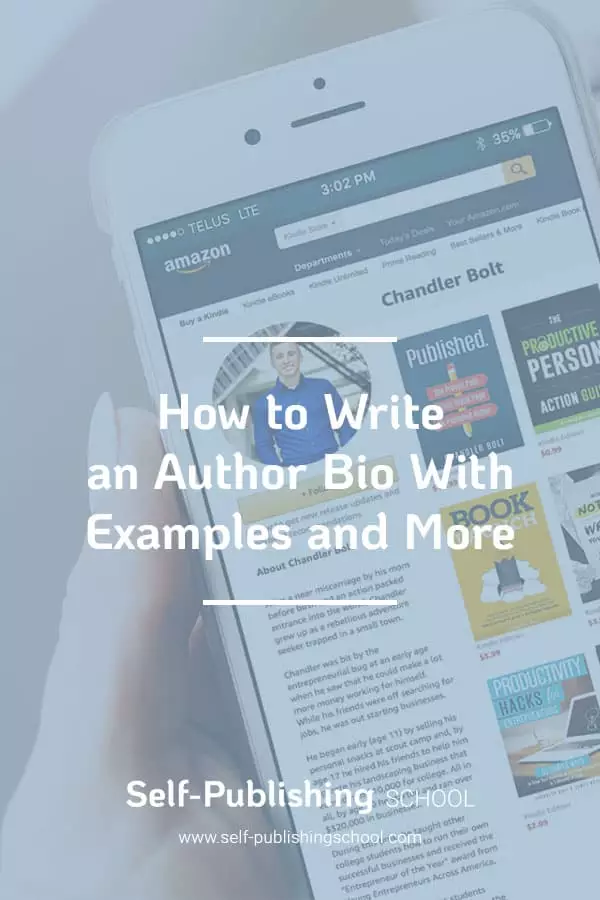
What some don't understand about authors is: if a reader likes you, they're very likely to enjoy what you write, because your essence bleeds into the pages.
Being able to showcase this with your personality can do worlds for your readers connecting with you and wanting to read your book out of curiosity if nothing else.
Here are a few tips to add personality to your author bio:
- Exaggerate your tone just a little in order for it to be more evident
- Be goofy and creative with how you describe yourself (See Jenna Moreci's example in #11)
- Have fun with it!
- Throw a joke in your bio
#6 – Include an achievement or award
In addition to your backlist of books, your awards, and education, you'll want your readers to know any higher-profile stuff you have going on.
Be sure to cover your awards, your following, and any big deal author interviews or features.
Again, if any of these this happened decades ago, it may not be relevant. But if you have a quarter-million followers on Twitter or on your blog, this will sell your authority (and yeah, a quarter-million sounds better than 250,000 but are the same number!).
If your writing has been nominated for awards but didn't make the cut, that is often fitting for an author bio too. "Award-nominated" anything is pretty cool!
#7 – Get personal in your author bio
Provide a bit of personal information to connect with your audience. The reason for this is if a reader sees something they have in common with you, it's an automatic bond and gives them more of a reason to buy.
It's standard for authors to share where they live and what their family make-up is.
A few non-divisive hobbies and interests are also often included. If you have experiences that are related, such as extensive travel or extreme situations, they may relevant to share as well.
Again, know your audience and choose wisely. Maybe (terribly) you were part of a cult as a child?
That's really interesting but unless you're sharing this story in the book or proves your authority on the subject at hand, skip including it in your author bio!
Bonus Author Bio Tip: Keep these bits broad enough to include a larger number of people. For example, if you play the flute, simply mention that you've been playing an instrument for however many years as this is more inclusive, and there's a higher chance of others connecting with you.
#8 – Author Bio Example – Chandler Bolt
We all known and love Chandler Bolt, Self Publishing School Founder. We wouldn't be here learning about writing without his hard work and book writing methods. Chandler's author bio on the back of his book Published is only three sentences long but packs in a lot of authority building, states facts plus toots his horn a bit.
These three sentences along with the killer book cover art work well to sell Chandler's mastery of book publishing.
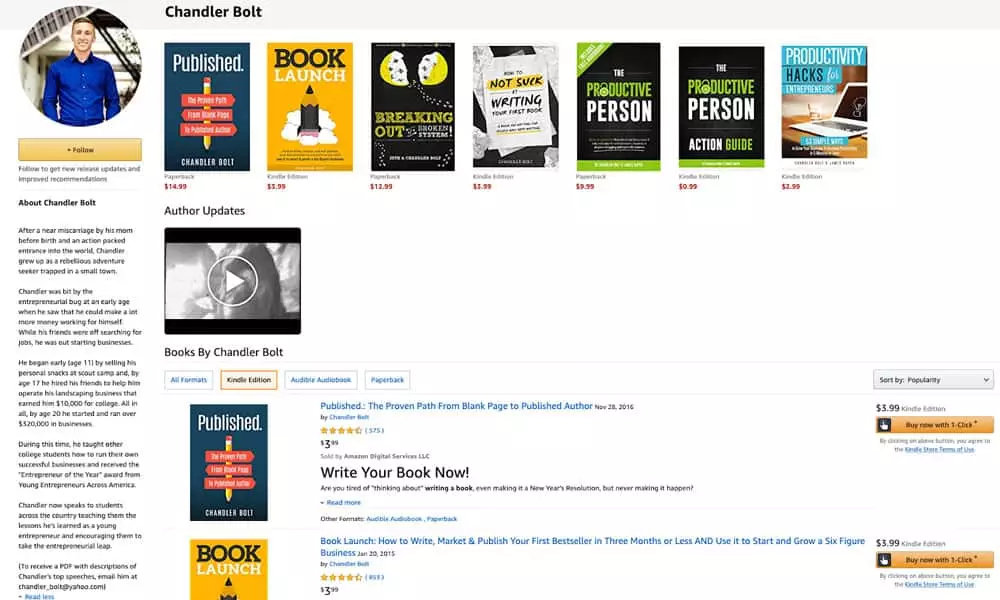
Chandler's Amazon Author Page is another version of his author bio. Here, Chandler gets really personal stating that his birth was almost miscarried!
He also gives some background about his entrepreneurial experience and awards.
#9 – Author Bio Example – Joanna Penn
Joanna Penn is a New York Times and USA Today bestselling thriller and nonfiction author who also writes under the pen names of JF Penn and Penny Appleton.
She's written and self-published nearly 30 books so she really knows what she's doing. On her Book Bub author page, Joanna's short bio is only (surprise!) three sentences.
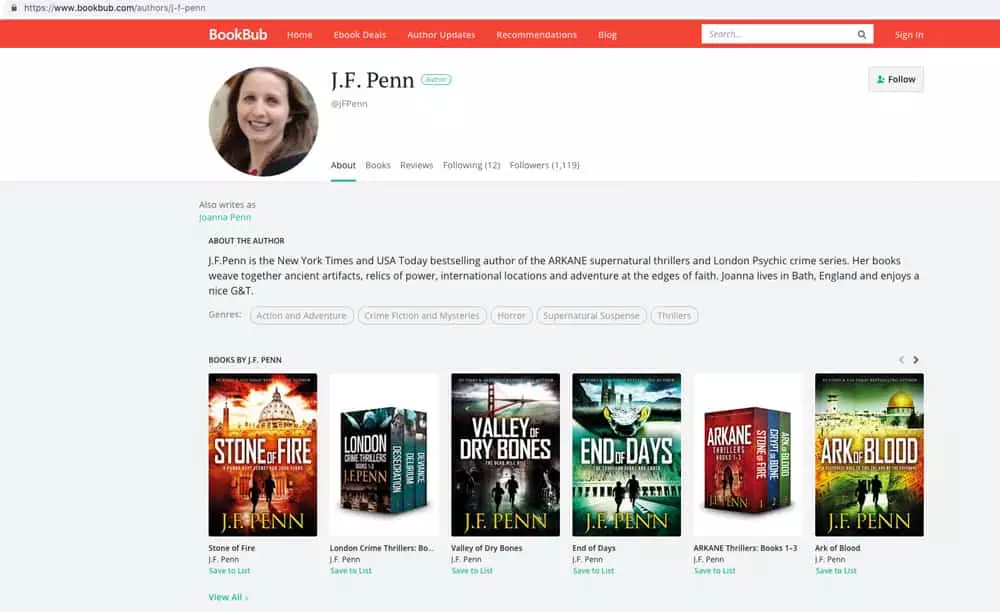
It concisely tells potential readers a short version of her accolades and narrows down her writing style quickly. Then it tells us where she lives and one of her favorite drinks.
On her own website, The Creative Penn, Joanna provides a different three-sentence version of her short bio and then gets into the details about all her books, the many awards and best-selling experience she's had plus where she lives and her favorite wine (a different drink mentioned here!)! Joanna's short bio on her page is three sentences and shoves in a ton of accolades into a small space.
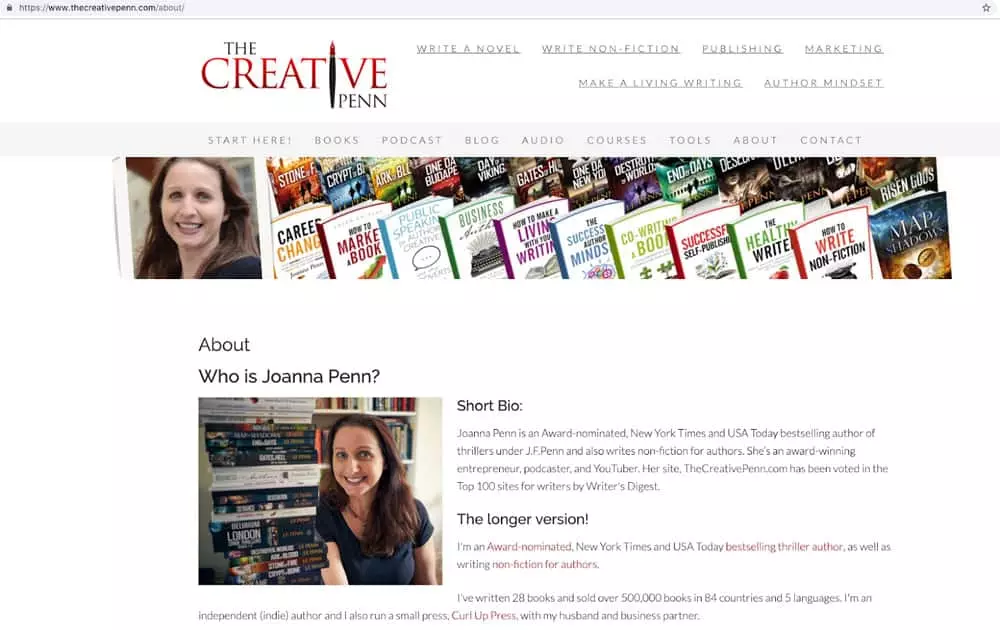
#10 – Author Bio Example – Amy Twigg
SPS alumni, Amy Twiggs, wrote her first book the Self Publishing School way and can now call herself a best selling author among her many other accomplishments (and there are many!).
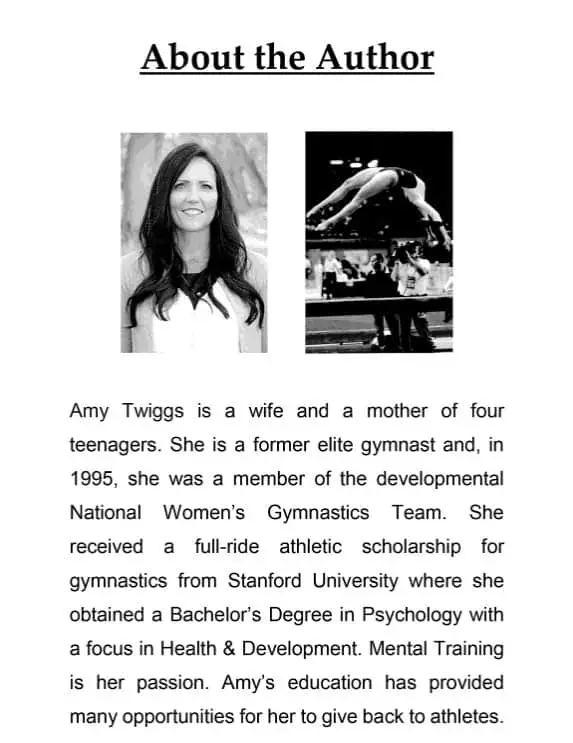
On her Goodreads page about the same book, she sells the book by telling prospective readers that she's been where they are and know "what it feels like to try your best and to fail.
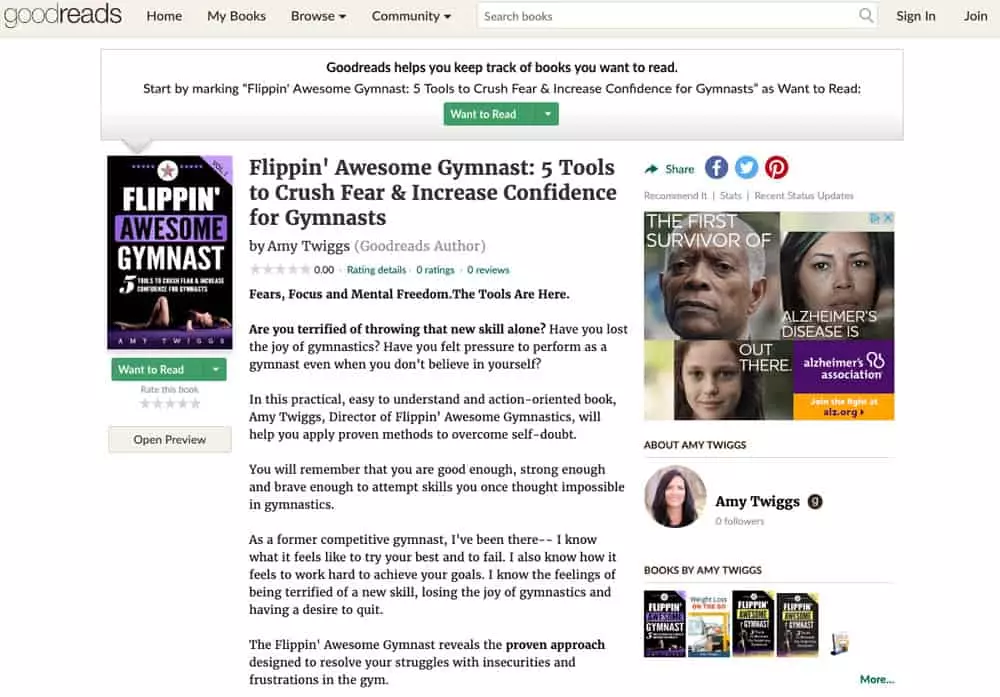
I also know how it feels to work hard to achieve your goals." She sells her wisdom and experience. Note that it is the norm to write in the first person on Goodreads but this is a big rule breaker everywhere else.
All of these examples have variations of author bios written in just a slightly different way for different applications. They all say very similar things about the same person.
#11 – Author Bio Example – Jenna Moreci
If you haven't heard of this full-time self-published author and Youtuber, that's surprising!
Not only does Moreci have ample experience when it comes to self-publishing, but she's also among one of the best examples of how to market your book effectively, including how she's written her author bio.
Here's an example of her Amazon author page with her bio:
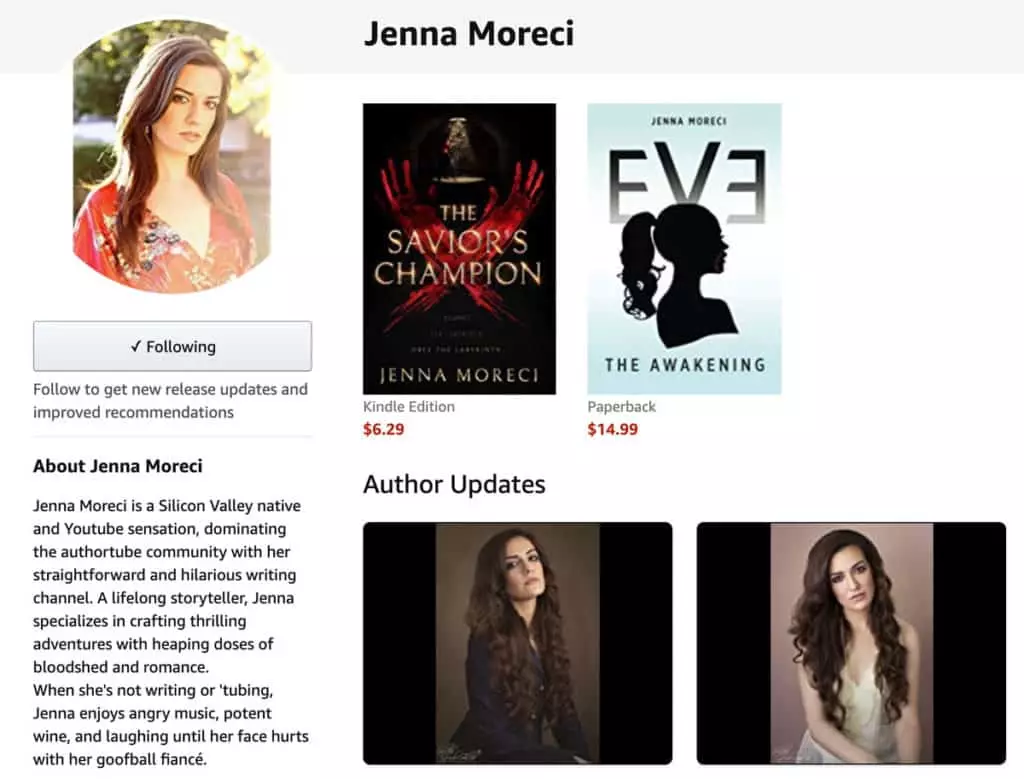
Notice how Moreci keeps it short, brief, but very clear with who she is, what she writes, and even has enough personal information to let readers into her life at an appropriate level.
If we take a look at her personal author website's "about" page, we'll see she has something similar, but with a few more additions, including her books and more.
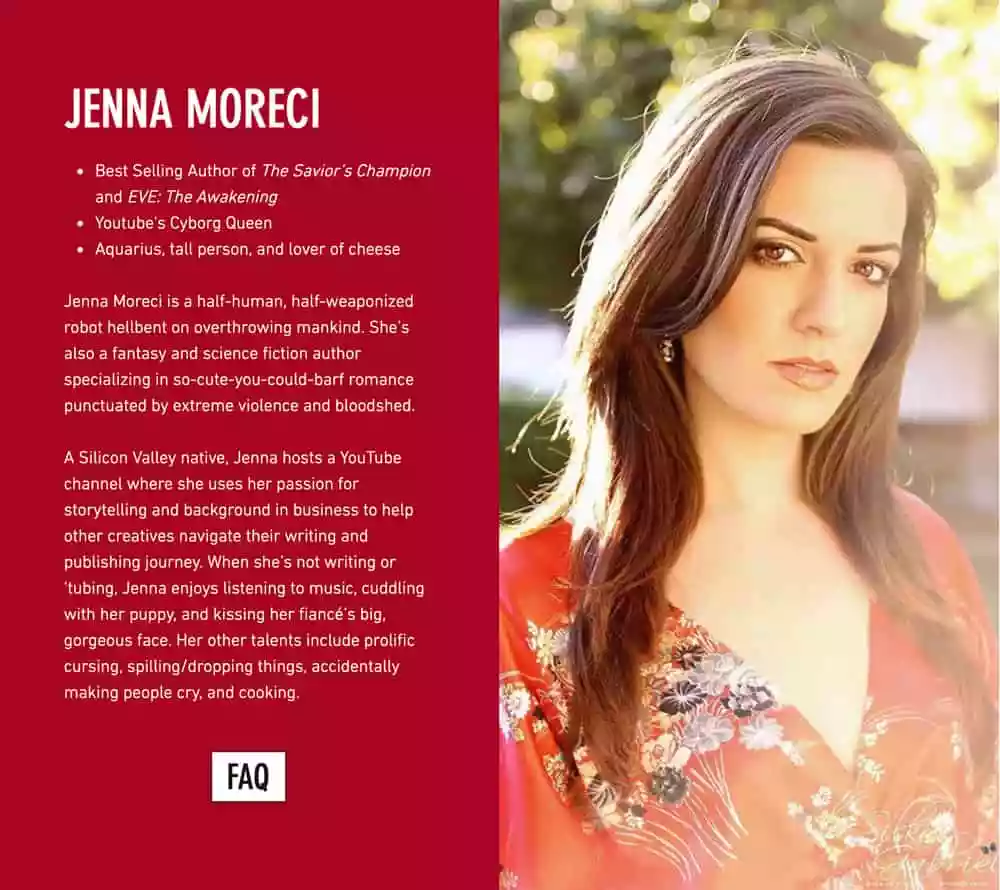
In this example, Jenna has also doused us with her personality, giving us insight into how she operates and therefore, the tone of some of her books.
More Ideas for Writing an Author Bio
Know the very essence of your book and find keywords that your readers may search for to find your book. When crafting your author bio, use these keywords that search engines can catch.
Although it may be irrelative in some bio spaces, add links to any free giveaways (we've got some ideas on that here..) on your website, your newsletter, social media or whatever web presence you have.
Also, feel free to add a call to action where applicable.
Final Author Bio Thoughts
Remember that there is no perfect bio, and there are no two alike. Although these are all good ideas, it's not an exact formula. Your author bio will be unique and will change as you write more books and gain more accolades (because we know you will!).
Now tell me the truth. Is your book really done? We can help you finish your manuscript and really make use of this carefully crafted author bio! Check out the training below to get started!
Do you have more author bio tips to share with our writing community? Do you think bios should be longer than three sentences or do you like this standard size?
Disclosure: Some of the links above may contain affiliate partnerships, meaning, at no additional cost to you, Self-Publishing School may earn a commission if you click through to make a purchase.
How To Write A Blog Author Bio
Source: https://self-publishingschool.com/author-bio/
Posted by: comesbeamer.blogspot.com

0 Response to "How To Write A Blog Author Bio"
Post a Comment